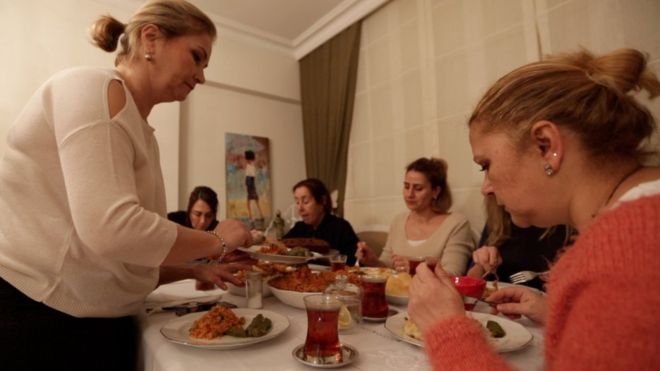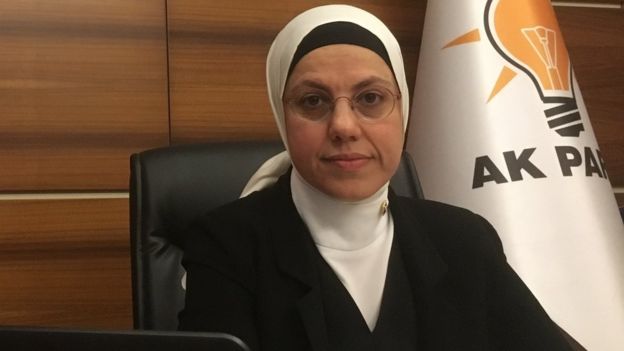As you see, there are women all over the world who have to fight even to get their basic rights. Amazing. And very sad.

For Emel Resuloglu and her circle it's a monthly tradition: the women's get-together around the dinner table, or "gün" in Turkish, when one member of the group gets a little money or a gold coin.
Turkey cherishes its traditions. But there's one that some here feel is holding the country back socially and economically - that of women not working, cast only as the home-maker.
"I got a university place but my father didn't want me to go", Ms Resuloglu says, as a freshly-baked cake is added to the table. "So I didn't work, I married and had children at 21 and I regret not studying.
"Some women can't find jobs and others in Turkey are married off young. It's an old-fashioned mentality."
Just 34% of women in Turkey work, by far the lowest of the 35 industrialised countries of the Organisation for Economic Cooperation and Development (OECD) where the average is 63%.
Critics of President Recep Tayyip Erdogan say his rhetoric is worsening the situation. At a rally two years ago, he called women who aren't mothers "deficient". Previously, he's urged women to have at least three children and denounced birth control as "treason".
Turkey now ranks 130 of 144 in the gender gap index of the World Economic Forum, based on access to health services, educational attainment, economic participation and political empowerment.
But Ravza Kavakci Kan, an MP with the ruling AK Party, says the government has liberated conservative women by revoking Turkey's old ban on headscarves in public institutions.
"This enables women who choose to wear the headscarf to join the workforce and get an education", she says. "But it takes time for policies to apply to real life."
Is it, though, right for the president to tell women how many children they should have or criticise those who choose not to have a family?

"As a president, he looks to the future of our society," she replies. "Turkey has an ageing population and we need more young people, so it's totally a demographic point of view."
There are just two female ministers in the Turkish cabinet - one is the minister for family.
"We're in a better place than we were - but we have a long way to go, just like many countries," concedes Ms Kavakci Kan.
BBC news

For Emel Resuloglu and her circle it's a monthly tradition: the women's get-together around the dinner table, or "gün" in Turkish, when one member of the group gets a little money or a gold coin.
Turkey cherishes its traditions. But there's one that some here feel is holding the country back socially and economically - that of women not working, cast only as the home-maker.
"I got a university place but my father didn't want me to go", Ms Resuloglu says, as a freshly-baked cake is added to the table. "So I didn't work, I married and had children at 21 and I regret not studying.
"Some women can't find jobs and others in Turkey are married off young. It's an old-fashioned mentality."
Just 34% of women in Turkey work, by far the lowest of the 35 industrialised countries of the Organisation for Economic Cooperation and Development (OECD) where the average is 63%.
Critics of President Recep Tayyip Erdogan say his rhetoric is worsening the situation. At a rally two years ago, he called women who aren't mothers "deficient". Previously, he's urged women to have at least three children and denounced birth control as "treason".
Turkey now ranks 130 of 144 in the gender gap index of the World Economic Forum, based on access to health services, educational attainment, economic participation and political empowerment.
But Ravza Kavakci Kan, an MP with the ruling AK Party, says the government has liberated conservative women by revoking Turkey's old ban on headscarves in public institutions.
"This enables women who choose to wear the headscarf to join the workforce and get an education", she says. "But it takes time for policies to apply to real life."
Is it, though, right for the president to tell women how many children they should have or criticise those who choose not to have a family?

"As a president, he looks to the future of our society," she replies. "Turkey has an ageing population and we need more young people, so it's totally a demographic point of view."
There are just two female ministers in the Turkish cabinet - one is the minister for family.
"We're in a better place than we were - but we have a long way to go, just like many countries," concedes Ms Kavakci Kan.
BBC news

No hay comentarios:
Publicar un comentario